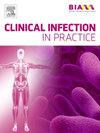依鲁替尼相关隐球菌性脑膜炎伴类固醇反应性免疫重建综合征1例
Q3 Medicine
引用次数: 0
摘要
背景隐球菌是免疫功能低下宿主中枢神经系统感染的重要原因。虽然在晚期HIV感染者中描述得最好,但在其他情况下也越来越多地看到,包括在伊鲁替尼(一种布鲁顿酪氨酸激酶抑制剂)患者中。为了很好地控制这种机会性感染,临床医生必须了解病原体和宿主的免疫系统。病例报告:我们报告一例隐球菌性脑膜炎(CM)在一个艾滋病毒阴性患者对伊鲁替尼慢性淋巴细胞白血病。在就诊时,他患有新型隐球菌真菌血症,并有隐球菌抗原阳性的淋巴细胞性脑脊液。他最初使用两性霉素B脂质体和氟胞嘧啶改善。然而,在治疗4周后,他出现了意想不到的临床和影像学恶化,出现了新的混乱和幻觉,并伴有广泛的脑膜轻脑膜增强和新的枕部微脓肿。脑脊液培养仍然是无菌的,他的病情恶化是由于停止使用依鲁替尼和真菌清除后免疫重建引起的炎症现象。他接受类固醇治疗,放射学和临床反应良好。免疫重建炎症综合征在HIV中有很好的描述;在非hiv相关CM中也越来越多地认识到感染后炎症反应综合征。本病例强调了在免疫功能低下宿主的新风险群体中管理机会性感染的挑战,并说明了病原体和宿主免疫之间的动态相互作用。我们在这里回顾了与隐球菌脑膜炎相关的炎症综合征的关键免疫机制。本文章由计算机程序翻译,如有差异,请以英文原文为准。
A case of ibrutinib-associated cryptococcal meningitis with a steroid-responsive immune reconstitution syndrome
Background
Cryptococcus is an important cause of central nervous system infection in immunocompromised hosts. Although best described in those with advanced HIV infection, it is increasingly being seen in other settings, including in patients on ibrutinib (a Bruton tyrosine kinase inhibitor). In order to manage this opportunistic infection well, clinicians must understand both the pathogen and the host immune system.
Case Report
We present a case of cryptococcal meningitis (CM) in an HIV-negative patient on ibrutinib for chronic lymphocytic leukaemia. At presentation, he was fungaemic with Cryptococcus neoformans and had a lymphocytic cerebrospinal fluid (CSF) with positive cryptococcal antigen. He improved initially with liposomal amphotericin B and flucytosine. Four weeks into treatment, however, he suffered an unexpected clinical and radiological deterioration, with new confusion and hallucinations, accompanied by widespread leptomeningeal enhancement and new occipital micro-abscesses on neuroimaging. CSF cultures remained sterile and his deterioration was attributed to an inflammatory phenomenon due to immune reconstitution, following cessation of ibrutinib and fungal clearance. He was treated with steroids with a good radiological and clinical response.
Discussion
An immune reconstitution inflammatory syndrome is well described in HIV; there is also increasing recognition of a post-infectious inflammatory response syndrome in non-HIV-associated CM. This case highlights the challenge of managing opportunistic infections in novel risk groups of immunocompromised hosts and illustrates the dynamic interplay between pathogen and host immunity. We review here the key immune mechanisms involved in inflammatory syndromes relating to cryptococcal meningitis.
求助全文
通过发布文献求助,成功后即可免费获取论文全文。
去求助
来源期刊

Clinical Infection in Practice
Medicine-Infectious Diseases
CiteScore
2.10
自引率
0.00%
发文量
95
审稿时长
82 days
 求助内容:
求助内容: 应助结果提醒方式:
应助结果提醒方式:


